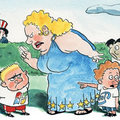Against the odds, Ireland's prime minister gets another term
| |
 | |
FOR three weeks opposition parties had pressed Irish voters to opt for change. And for a while they looked like succeeding, as the electorate briefly flirted with the idea of a new government. But in the end voters chose not to oust Bertie Ahern from office after ten years running Europe’s most successful economy. On polling day voters opted for continuity instead of replacing Mr Ahern with an alternative centre-left government. Their heads (and their wallets) ruled their hearts, and they chose stability. By the night of Saturday May 26th, when the votes in the general election were finally counted, Mr Ahern and his Fianna Fail party had emerged the surprise winners, by a small margin.
Three times in a decade, Ireland’s “Teflon” taoiseach (prime minister) has led his party to a stunning victory. On June 14th, he is expected to be re-elected as taoiseach for a third successive term too. As in 1997, most likely he will form a minority centre-right coalition with the Progressive Democrats, a liberal party which lost its leader and most of its members, and rely on the support of some independents; or failing that he might forge an alliance with the Greens.
It was an election victory that few had predicted. Neither bookmakers, pollsters nor pundits imagined that Fianna Fail would lose a mere three seats in the 166-seat Dail (parliament). Most thought the party would suffer far more. At the outset of the campaign, Fianna Fail was trailing in the polls, and matters could hardly have been worse. Its leader, Mr Ahern, had become embroiled in a fresh row about his personal finances, involving undeclared loans and gifts received when finance minister in the 1990s. And Michael McDowell, the leader of the Progressive Democrats, his junior coalition partner, was threatening to leave government if the taoiseach failed to clarify matters fully.
Mr Ahern did so, and to almost everyone’s satisfaction, in what proved to be a turning-point in the campaign. His detailed explanation was the start of his election fight back, and of Fianna Fail’s recovery in the polls. Two days later, on May 16th, the taoiseach was the first Irish leader to address a joint session of both houses of Parliament at Westminster. Tony Blair and Bill Clinton later pitched in with their support, by offering an unprecedented (albeit solicited) public endorsement of Mr Ahern for his role in the Northern Ireland peace process. And, on May 18th, Mr Ahern was perceived to have won a widely watched television debate with Enda Kenny, leader of Fine Gael, the main opposition party.
In a matter of days Mr Ahern was transformed from a tired and dispirited leader on his way out of office into a statesman, whose skills in managing Ireland’s economic success offered just the reassurance necessary to rally undecided voters. Whether the electorate's continued confidence in his economic stewardship is justified remains to be seen. The economy is still expanding, but less exuberantly than it was. Increasing interest rates are beginning to curb the excesses in the property market. Sharply rising personal debt levels have dented consumer confidence.
One of the most remarkable turnarounds in Ireland’s electoral politics and the greatest comeback in Fianna Fail’s election history will have repercussions for Irish politics too. The casualties are the smaller political parties, squeezed in a presidential-style campaign that was dominated by Fianna Fail and Fine Gael, which have their origins in Ireland’s civil war in 1922.
No party was more tightly squeezed than Sinn Fein. It had hoped to double its representation in the Dail to ten seats but instead lost one. In power in Northern Ireland, the party had hoped to realise its ambition to be in government both north and south of the border. It failed dismally, with its president, Gerry Adams, failing to strike a chord with southern voters, and showing little understanding of economics, or familiarity with the detail of southern politics. In the end this vote for the status quo was a vote for the Celtic Tiger, and against any change that might threaten its survival.




